Domestic violence, fire and mental illness — how these Topeka residents ended up unhoused
Mary Schierkolk-Ames never imagined that she'd be homeless.
But since leaving an abusive relationship, the 54-year-old Washburn Rural High School graduate said she has lived in her Jeep for the past month and a half.
"They say all the people in the streets are bad, but they're not," Schierkolk-Ames said. "They don't know our situation. And until you know the story, don't judge people."
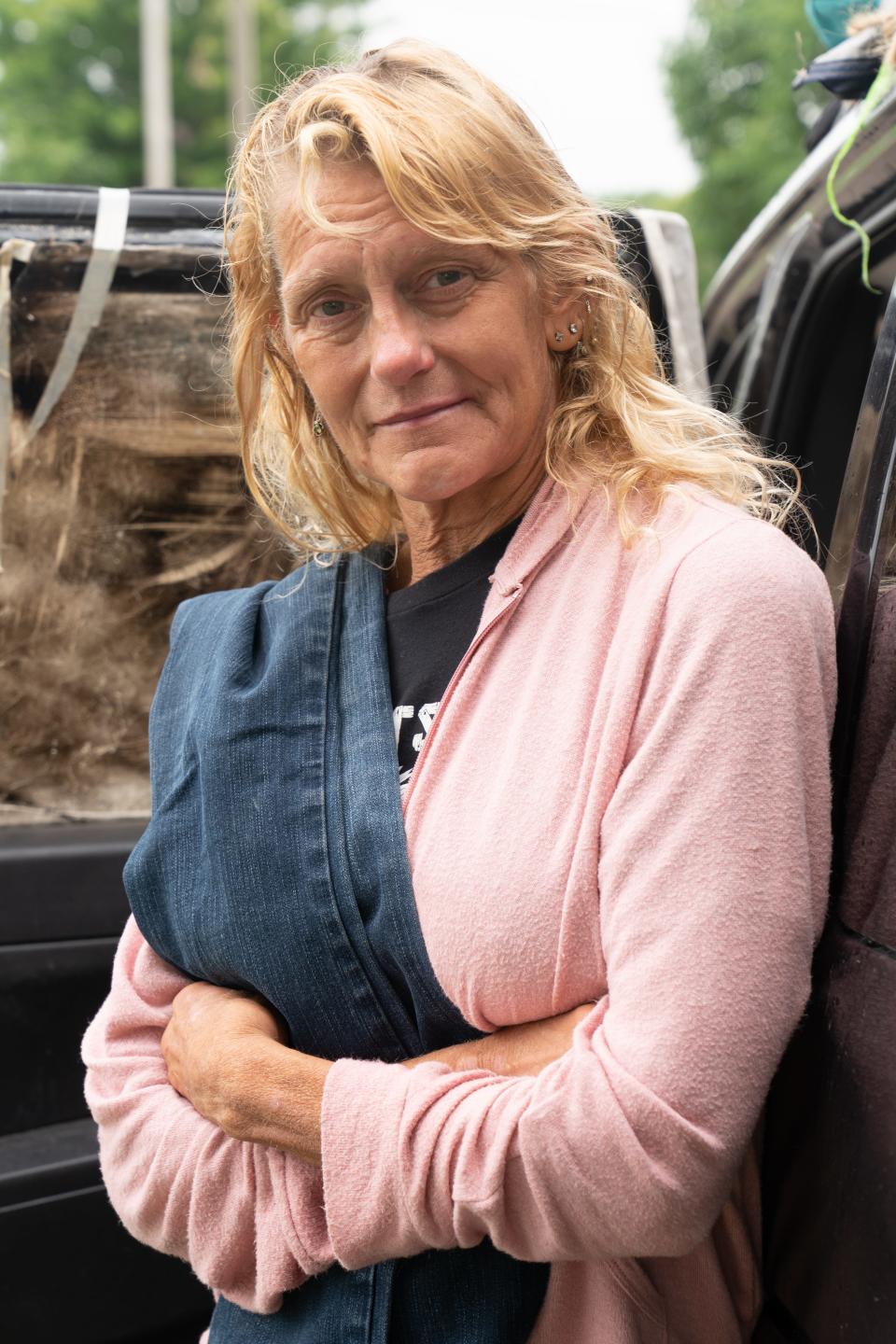
How much did Topeka's homeless population rise this year?
As local leaders explore such ideas as low-barrier shelters and work with a consultant, The Capital-Journal talked to Schierkolk-Ames and other unsheltered residents about their views on rising homelessness.
Topeka's annual Point In Time Homeless Count, taken Jan. 25, showed that the number of unsheltered people here had risen by 13%, to 412 this year from 365 the year before.
Amid complaints that homeless camps were creating eyesores and public health concerns, Topeka's mayor and city council voted Feb. 7 to hire Evanston, Ill.-based Sylver Consulting LLC for $76,080 to help the city with that.
Brianna Sylver, president of Sylver Consulting, will seek guidance from the mayor and council while appearing virtually at a special meeting they will have at 6 p.m Tuesday.
City of Topeka shouldn't let vacant homes 'sit and rot'
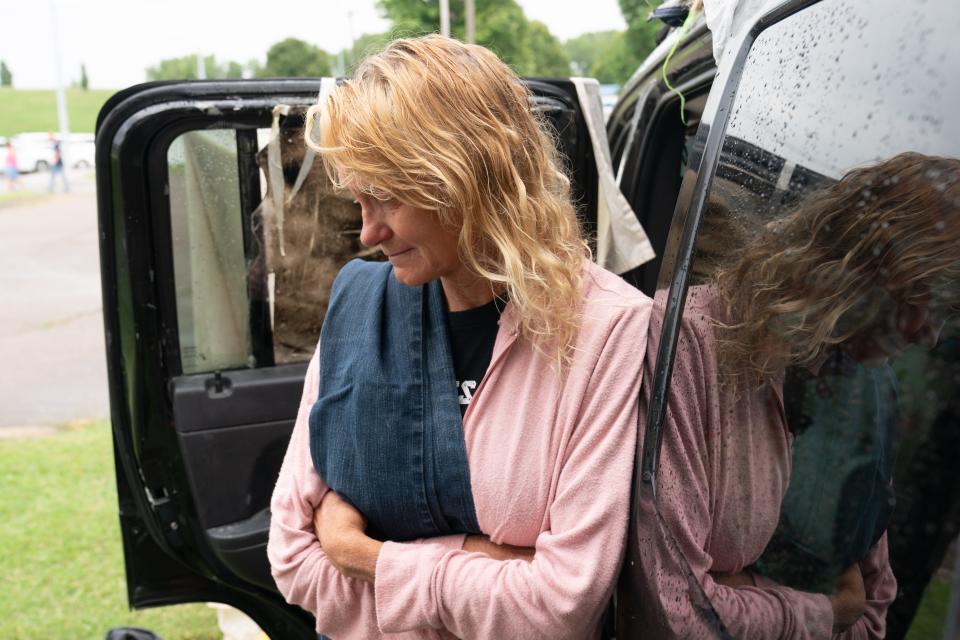
Schierkolk-Ames has a suggestion for city officials.
"We've got all these vacant homes around here," she said. "Instead of letting them sit and rot, set up a program where people will be able to get into them and fix them up, and then buy them."
Schierkolk-Ames — the mother of three grown children, all of whom also graduated from Washburn Rural — said she is married but trying to get divorced.
"I can't even afford an attorney to get divorced," she said.
Schierkolk-Ames said she tries to walk around North Topeka and pick up trash during the day, as that gives her "something to do."
"I don't talk to many people," she said.

Schierkolk-Ames spends her nights in her Jeep, which was parked Friday in a lot in North Topeka.
Every night, she locks the doors before going to sleep.
She's not sure how safe she might be, noting the Plexiglas where her left rear window used to be.
"He broke it," she said of her ex.
'I don't want to continue to live outside'

Eddie Perkins sleeps outside under the stars during the warm-weather months.
Perkins, a 54-year-old alumnus of Topeka High School, has schizophrenia, he said.
He talked to The Capital-Journal while sitting on his mattress southwest of the Topeka Rescue Mission homeless shelter run by TRM Ministries Inc. at 600 N. Kansas Ave.
"I don't want to continue to live outside," Perkins said. "I want a place of my own. I'd like to get a job, and work."
Being homeless is hard, he said.
"It's difficult to survive," Perkins said.
'Locked up in Topeka State Hospital'

Perkins said his parents both died the same year from medical problems when he was young, and he then "got locked up in Topeka State Hospital."
Topeka was known in the 1960s and 1970s as a national leader in mental health services, after the state in 1949 nearly doubled what it spent on its hospitals for people with mental illness, including Topeka State Hospital.
The state then shifted increasingly toward arranging for its mentally ill to be treated in a growing network of community mental health centers instead of state hospitals. Topeka State Hospital closed in 1997.
Perkins also received treatment as a child from Topeka's nationally known Menninger Foundation, he said. That organization left this community for Houston in 2003.
Perkins said he tries not to interact with other people much.
He said he doesn't want to live in the rescue mission because the other residents pick on him.
TRM official: Homelessness can happen to just about anyone
La Manda Broyles is executive director of TRM, which since 1953 has served homeless, hungry and impoverished citizens in the Topeka community. Its main shelter is located at 600 N. Kansas Ave.
Homelessness can happen to just about anyone, Broyles told The Capital-Journal earlier this year, saying TRM's clients have included a lawyer, a physician, nurses and people from various other professional occupations.
Broyles has run TRM for 15 months, during a time that has seen increased public concern about homelessness here.
'I preach Jesus on the streets'

"Most of the people who are homeless are mentally ill," said Jeffery Buddenhagen.
Buddenhagen, 61, and his fiancee, 54-year-old Patsy Kerbo, live in a campsite just across the street southeast of the rescue mission.
"I preach Jesus on the streets," Buddenhagen said.
Kerbo said she tries to help out other homeless people, including picking up food from local pantries to share.
"If I see somebody in need who's worse off than I am, I'll give them the shirt off my back to make sure they've got somewhere to go, something to wear or something in their stomach," Kerbo said.
Buddenhagen and Kerbo live on his disability payments.
Kerbo has been unable to get such payments, even though she's been "trying so hard and jumping through every hoop and doing everything they want me to do," she said.
'To get a home, and have peace'

Their ultimate goal, Buddenhagen said, is "to get a home, and have peace."
Kerbo graduated from high school in Missouri but considers Topeka to be her hometown.
Buddenhagen is a native of Arma, near Pittsburg in southeast Kansas.
They've been homeless about four years, after previously living in a mobile home court.
"I try not to make friends out here, because you never know what's going to happen," Kerbo said.
But she made a special friend three days ago when a couple in a car stopped next to their campsite and gave them a little dog, whom they call Rosie.
Kerbo petted Rosie on Friday, then watched her play with a squeaky toy octopus.
"She's so precious," Kerbo said. "She just makes my day."
As long as he had a cabin, Cody Bartley didn't feel homeless

Cody Bartley has a dog named Spike, who lives with him in the Tent City community east of the Rescue Mission.
When Bartley puts Spike on a chain and leaves, the dog makes a whine that sounds like he's saying, "I love you," Bartley said.
But Spike, a nearly 2-year-old American Bully Staffordshire Terrier who hates conflict, snuck off recently as Bartley and his girlfriend were arguing, he said.
Spike ended up at the Helping Hands Humane Society shelter, and Bartley said Friday that a friend of a friend was going to give Bartley a ride there to pick him up.
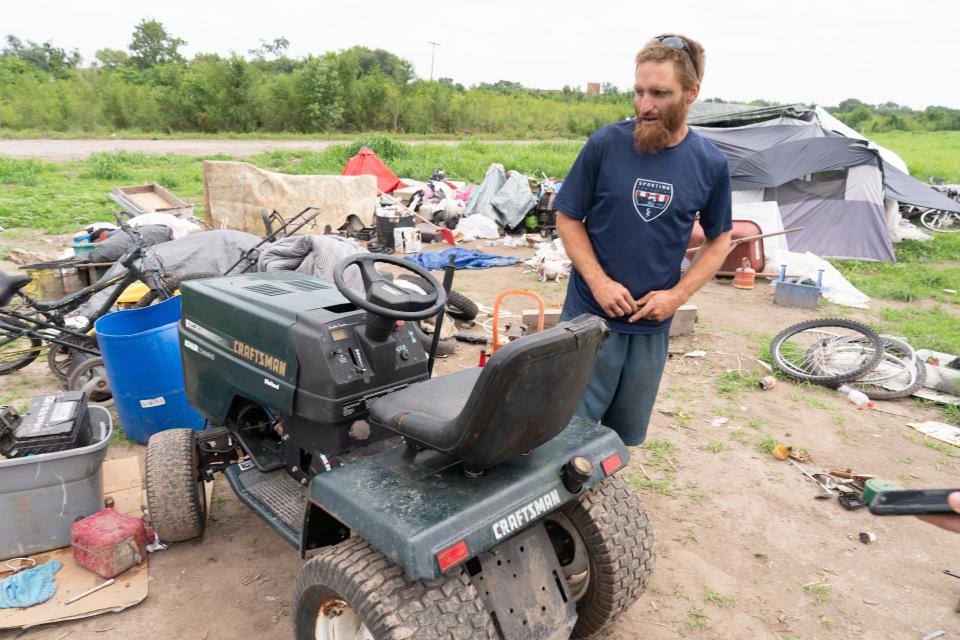
Bartley said he became homeless about five years ago after the break-up of a domestic relationship.
He said he has lived the past three years in the Tent City area, where he built an impressive, cabin-like structure.
As long as he had that cabin, Bartley said, he didn't feel homeless.
Advance warning given before Topeka's city government had the camp bulldozed last year gave Bartley sufficient time to take down and save the walls in advance, then rebuild afterward, he said.
But the camp was again bulldozed a month or two ago, and that time Bartley didn't have time to prepare, he said.
His cabin was destroyed.
Now he's living in a tent, which he said is falling apart amid the storms this area has seen this year.
Topeka West alum makes money by collecting scrap metal
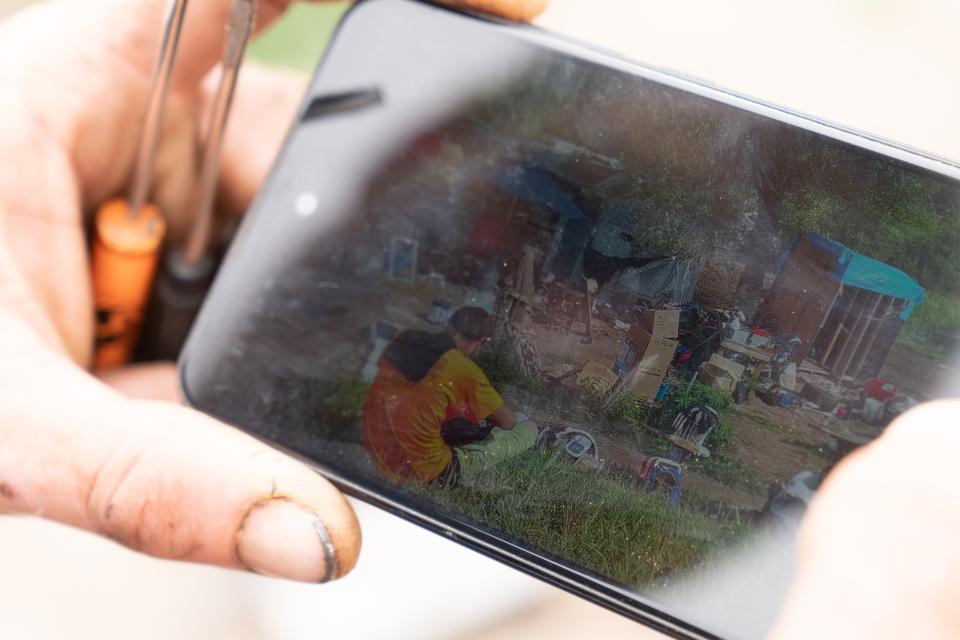
An alumnus of Topeka West High School, Bartley said he has training in residential construction from Washburn Institute of Technology but lacks the licensing, transportation and tools he needs to get a job in that area.
So Bartley said he makes money by selling dealers legally obtained scrap metal, which he loads onto a trailer. He pulls the trailer using a lawn tractor.
Both are among possessions Bartley keeps at his campsite.
Topeka police haven't bothered street corner solicitor
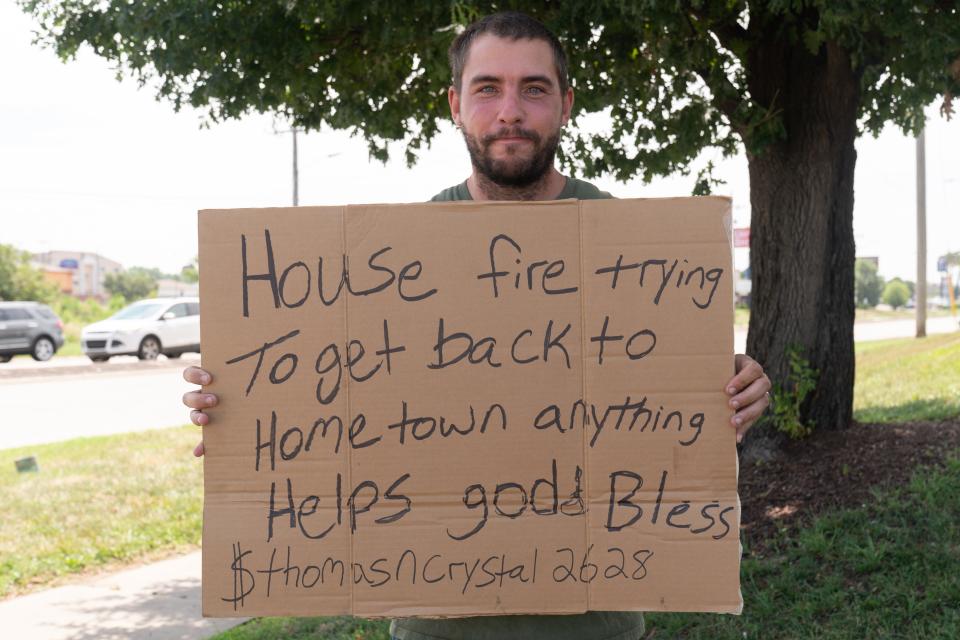
Thomas Shull makes money a different way, by soliciting drivers at an intersection in west Topeka.
Complaints about panhandling by homeless people led Topeka's mayor and city council in January 2020 to ban pedestrians from interacting with vehicle occupants at 23 specific, listed Topeka intersections.
But Shull said he hadn't had any interactions with Topeka police.
"We've had the police drive by quite a bit," he said. "They just keep on moving."
That's probably because the 23 listed crossings don't include S.W. Wanamaker and Winding Road, where Shull stood Friday on the southwest corner with a sign that asked for cash and said he was trying to get to St. Louis.
Shull said that he, his wife, Crystal, and their 8-month-old son are staying in a Topeka motel after the Junction City mobile home they rented burned down two weeks ago, destroying almost all they owned and damaging their car.
But he said they still have that car, and are making their way eastward to his hometown of St. Louis, where he has family.
Shull's sign included a CashApp address people could use to donate.
As Shull stood beneath a tree holding his sign, he said, some passing motorists waved or donated cash while another yelled at him to "get a (expletive) job."
Shull actually wants to find a job, he said.
He described himself as being a "jack of all trades."
Here's what Topeka's anti-soliciting ordinance says
Topeka city ordinance bans pedestrians from interacting with vehicle occupants at the 23 crossings within city limits that saw the most crashes due to distracted driving, according to the Transportation Safety Plan put out in 2019 by the Metropolitan Topeka Planning Organization.
Complaints about violations of that ordinance may be made by calling 785-368-9551 or using the city's SeeClickFix application.
Contact Tim Hrenchir at threnchir@gannett.com or 785-213-5934.
This article originally appeared on Topeka Capital-Journal: Topekans share how they found themselves living here unsheltered

